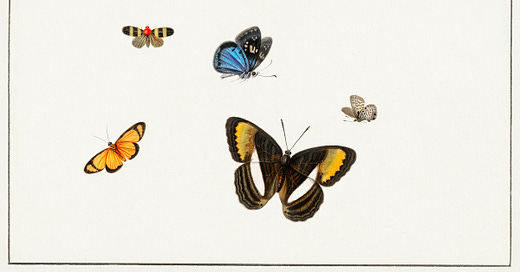Grand Challenges in Animal Conservation, filmmaker Craig Foster on his octopus teacher, surfing in Iceland, and more...
Weekly Fieldnotes in Environmental Communication
Hi everyone, welcome back to Wild Ones, a bi-weekly digest by me, Gavin Lamb, about news, ideas, research, and tips in environmental communication. If you’re new, welcome! You can read more about why I started Wild Ones here. Sign up here to get these digests in your inbox:
What I’m reading
Grand Challenges in Animal Conservation by Ronald R. Swaisgood, Director of Recovery Ecology at the San Diego Zoo and General Scientific Director of the Cocha Cashu Biological Station in Manu National Park, Peru (Published 22 September 2020, in Frontiers in Conservation Science).
This is a cutting-edge overview of current challenges and breakthroughs in wildlife conservation research and practice. It covers a lot, but Swaisgood raised an interesting issue about the best strategies for communicating conservation policy to conservation practitioners:
“Equally important is research designed to inform conservation policy, so that decision-makers can use the best available science to guide decisions. This information will of course be useless if it is not made available to those making management and policy decisions, and bridging the scientist-practitioner gap will require novel approaches to communication and collaboration, and may require a sea change in the cultures of both sides of the divide. Conservation Evidence, an online compilation of published conservation interventions, is a good foundation on which to build.”
What I’m listening to
Filmmaker Finds An Unlikely Underwater Friend In 'My Octopus Teacher.’ South African documentary filmmaker Craig Foster is interviewed about his new documentary film on Netflix: “My Octopus Teacher” (trailer on YouTube). Here’s an excerpt from the interview:
“The excitement for me has been to slowly uncover the secret lives of many of these cryptic animals. My incredible octopus teacher, she helped me in many ways to uncover many of those lives, because she's in the middle of this food web. And to know her, you have to know so many animals that she preys on, and of course her predators as well, and then all the scavengers that come to her den. She's this amazing teacher in many ways for the other lives of the animals in the forest.” – Craig Foster
What I’m watching
UNNUR, directed by Chris Burkard.
This is a beautifully-shot short (19 min) documentary by an outdoor and surf filmmaker whose work I’ve admired for a while now, Chris Burkard. The film offers a glimpse into Icelandic photographer Elli Thor’s life surfing and kayaking in Iceland, his work as a photographer, and his priority to share moments of connection to the natural world with his daughters. At one point in the film, Elli says, “Some people think what I do is cool. But other people, even my own family, think it’s a complete waste of time.”
Here’s the description of the film: “Elli Thor is an Icelandic photographer, surfer, and former kayaker. A decade ago Elli nearly drowned under a waterfall while kayaking a challenging Icelandic river. The near-death experience became a catalyst for personal growth and his professional career. After walking away from kayaking, a newfound passion for surfing and the birth of his daughter Unnur gave him a new perspective worth living for.”
Eco-Tool I’m using
How to Talk About the Ocean so that People Will Listen: A Quick Guide, created by Frame Works, a non-profit research center developing applied communication strategies for social/environmental advocacy and change. Or as they put it: “We apply rigorous social science methods to study how people understand social issues and develop evidence-based techniques to explain those issues more effectively.”
Quote I’m thinking about
“Caring means becoming subject to the unsettling obligation of curiosity, which requires knowing more at the end of the day than at the beginning.”
—Donna Haraway, in When Species Meet (Minneapolis: University of Minnesota Press, 2008, p 36).




